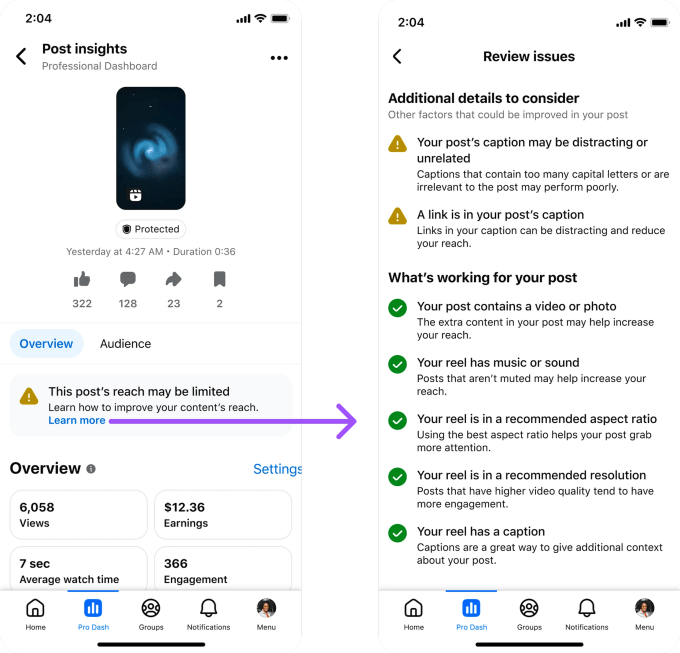Meta announced on Monday that it will take additional measures to crack down on accounts sharing “unoriginal” content to Facebook, meaning those that repeatedly reuse someone else’s text, photos, or videos. This year, Meta has already taken down around 10 million profiles that were impersonating large content creators, it said.
Plus, it has taken action against 500,000 accounts that were engaged in “spammy behavior or fake engagement.” Those actions have included things like demoting the accounts’ comments and reducing the distribution of their content to prevent the accounts from monetizing.
The update from Meta follows only days after YouTube said it was also clarifying its policy around unoriginal content, including mass-produced and repetitive videos — things that have become easier to generate with the help of AI technology.
Like YouTube, Meta says it won’t penalize users who are engaging with other people’s content, doing things like making reaction videos, joining a trend, or adding their own takes. Instead, Meta’s focus is on the reposting of others’ content, either on spam accounts or those that pretend to belong to the original creator.
Accounts that abuse the system by repeatedly reusing someone else’s content will lose access to Facebook monetization programs for a period of time and see reduced distribution of their posts, the company said. When Facebook detects duplicate videos, it will also reduce the distribution of the copies to ensure the original creator gets the views and credit.
In addition, the company said it’s testing a system that adds links on duplicate videos that point viewers to the original content.
The update arrives as Meta weathers criticism from users across its platforms, including Instagram, about erroneous, over-enforcement of its policies through automated means. A petition with nearly 30,000 signatures asks Meta to fix the issue with wrongfully disabled accounts and its lack of human support, which has users feeling abandoned and has hurt many small businesses. Meta has not yet publicly addressed the issue, despite attention from press and other high-profile creators.
While Meta’s newest crackdown is focused more on accounts that steal others’ content for profit, issues around unoriginal content are growing.
With the rise of AI technology, platforms have become flooded with AI slop, a term referencing low-quality media content made using generative AI. On YouTube, for instance, it’s easy to find an AI voice overlaid on photos, video clips, or other repurposed content, thanks to text-to-video AI tools.
Meta’s update seemingly only focuses on reused content, but its post suggests that it may be taking AI slop into consideration, too. In a section where the company offers “tips” for making original content, Meta notes that creators shouldn’t just be “stitching together clips” or adding their watermark when using content from other sources, and they should focus on “authentic storytelling,” not short videos offering little value.
Without directly saying so, these types of unoriginal videos are also things that AI tools have made it easier to produce, as low-quality videos will often feature a series of just images or clips (either real or AI), with added AI narration.
In the post, Meta also warns creators not to reuse content from other apps or sources, which has been a longstanding rule. It also notes that video captions should be high quality, which could mean cutting down on the use of automated AI captions that aren’t edited by the creator.

Meta says these changes will roll out gradually over the months ahead, so Facebook creators have time to adjust. If creators think their content isn’t being distributed, they can view the new post-level insights in Facebook’s Professional Dashboard to see why.
Creators will also be able to see if they’re at risk of content recommendation or monetization penalties in the Support home screen from their Page or professional profile’s main menu.
Meta typically shares information about its content takedowns in its quarterly Transparency Reports. In the last quarter, Meta said that 3% of its worldwide monthly active users on Facebook were fake accounts, and it had taken action on 1 billion fake accounts from January through March 2025.
More recently, Meta has backed away from fact-checking content itself in favor of Community Notes in the U.S., similar to X, which allows users and contributors to determine if posts follow Meta’s Community Standards and are accurate.
Read the full article here